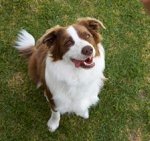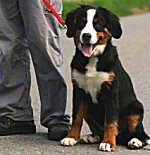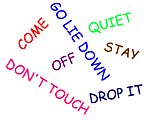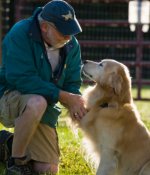Norwegian Elkhounds: What's Good About 'Em, What's Bad About 'Em
Norwegian Elkhound temperament, personality, training, behavior, pros and cons, advice, and information, by Michele Welton, Dog Trainer, Behavioral Consultant, Author of 15 Dog Books
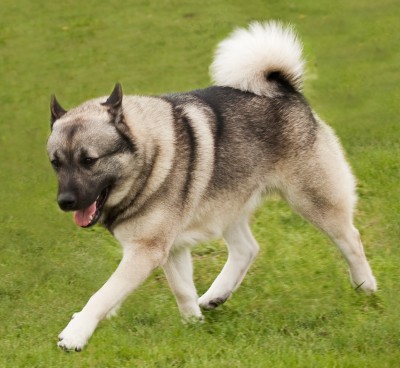
The AKC Standard says, "Bold and energetic, an effective guardian yet normally friendly, with great dignity and independence of character."
Definitely this is a capable, confident dog with a strong presence, whose self-reliance requires supervision and leadership.
The Norwegian Elkhound is a bundle of energy just waiting for the signal to go. This rugged breed plays hard and enjoys vigorous exercise – leashed or in a safe enclosed area, for many Elkhounds have strong hunting and chasing instincts.
Most Norwegian Elkhounds are friendly with strangers and must be taught not to jump up into their faces. Others are more restrained with strangers. But even the friendly ones are great watchdogs, meaning they are keenly alert for anything out of the ordinary. When they see or hear anything unusual, they bark.
And bark. And bark. Elkhounds are very vocal dogs. They hunt by cornering their prey and feinting to and fro to hold it in position, all the while barking nonstop to signal their location to the hunter. Couple that with their high-pitched, piercing voice, and.... well, let's just say you will upset your neighbors if you leave this breed outside unsupervised.
Norwegian Elkhounds usually get along well with other family pets if raised with them. But some individuals can be aggressive with other dogs of the same sex, and some are confirmed cat chasers. Remember, this is a hunting breed.
Training can be a challenge, as the Elkhound is dominant and headstrong and may use his intelligence in clever ways that suit his own purposes. Yet owners who know how to lead will find him eminently trainable.
If you want a dog who...
- Is a medium-sized member of the spitz family (dogs with a wolfish face, prick ears, thick coat, and curled tail)
- Is sturdy and rugged, yet athletic and agile
- Plays vigorously and likes a lot of outdoor exercise, especially in cold weather
- Is a bold, confident, self-assured dog with a strong presence
- Is polite with strangers, yet with his keen senses and watchful attitude, makes a dependable alarm dog
A Norwegian Elkhound may be right for you.
If you don't want to deal with...
- Vigorous exercise requirements
- Rowdiness and exuberant jumping, especially when young
- Suspiciousness toward strangers when not socialized enough
- Strong-willed mind of his own, requiring a confident owner who can take charge
- Lots of barking
- Heavy shedding
A Norwegian Elkhound may not be right for you.
 |
Dog Breed Traits – Which Traits Are Right For You? In this brand new series, I'll help you decide which dog breed traits would best suit you and your family, your home and yard, and your lifestyle, so you can choose the best dog breed for your family. |
Keep in mind that the inheritance of temperament is less predictable than the inheritance of physical traits such as size or shedding. Temperament and behavior are also shaped by raising and training.
FREE eBooks by Michele Welton
![]() "Respect Training for Puppies" and "Teach Your Dog 100 English Words" are free step by step guides to teaching your pup to be calm and well-behaved.
"Respect Training for Puppies" and "Teach Your Dog 100 English Words" are free step by step guides to teaching your pup to be calm and well-behaved.
![]() "11 Things You Must Do Right To Keep Your Dog Healthy and Happy" is a free guide to keeping your dog mentally, physically, and emotionally happy and healthy so you can enjoy a longer lifetime of companionship.
"11 Things You Must Do Right To Keep Your Dog Healthy and Happy" is a free guide to keeping your dog mentally, physically, and emotionally happy and healthy so you can enjoy a longer lifetime of companionship.

- You can avoid some negative traits by choosing an ADULT dog from an animal shelter or rescue group. With an adult dog, you can easily see what you're getting, and plenty of adult Elkhounds have already proven themselves not to have negative characteristics.
- If you want a puppy, you can avoid some negative traits by choosing the right breeder and the right puppy.
More traits and characteristics of the Norwegian Elkhound
If I was considering a Norwegian Elkhound, I would be most concerned about...
- Providing enough exercise and mental stimulation. Young Norwegian Elkhounds (up to about two years old) romp and jump with great vigor, and things can go flying, including toddlers and infirm people. Elkhounds don't need miles of running exercise, but they must have daily opportunities to vent their energy in a large, safely-enclosed area. Elkhounds who don't get enough exercise or companionship throughout the day are quickly bored – and bored Elkhounds are prone to destructive chewing.
- Barking. I've repeated this several times, because it's important. I've owned this breed and experienced the barking first-hand! Elkhounds are quick to sound the alarm at every new sight and sound. You have to be equally quick to stop them. But you can only do this if you have established the right relationship with your dog, where you are the leader and he is the follower. That's what respect training is all about.
- Heavy shedding. Another hallmark of the Norwegian Elkhounds is shedding. Hair and fur everywhere. Just so you know!
- Mind of their own. Norwegian Elkhounds are not eager-to-please Golden Retrievers. They are capable of learning a great deal, but they have an independent mind of their own and are not pushovers to raise and train. They are often manipulative, and some are willful and dominant (they want to be the boss). You must show them, through absolute consistency, that you mean what you say.
To teach your Elkhound to listen to you, "Respect Training" is mandatory. Follow my free online training programs.
My best-selling books – now available FREE on my website
 Respect Training For Puppies: 30 seconds to a calm, polite, well-behaved puppy is for puppies 2 to 18 months old. Your puppy will learn the 21 skills that all family dogs need to know. Click here to read for free.
Respect Training For Puppies: 30 seconds to a calm, polite, well-behaved puppy is for puppies 2 to 18 months old. Your puppy will learn the 21 skills that all family dogs need to know. Click here to read for free. Teach Your Dog 100 English Words is a unique Vocabulary and Respect Training Program that will teach your adult dog to listen to you and do what you say. Click here to read for free.
Teach Your Dog 100 English Words is a unique Vocabulary and Respect Training Program that will teach your adult dog to listen to you and do what you say. Click here to read for free. 11 Things You Must Do Right To Keep Your Dog Healthy and Happy helps your dog live a longer, healthier life. Get my honest advice about all 11 Things before you bring home your new puppy, because some mistakes with early health care cannot be undone. Click here to read for free.
11 Things You Must Do Right To Keep Your Dog Healthy and Happy helps your dog live a longer, healthier life. Get my honest advice about all 11 Things before you bring home your new puppy, because some mistakes with early health care cannot be undone. Click here to read for free.Related posts you might enjoy



